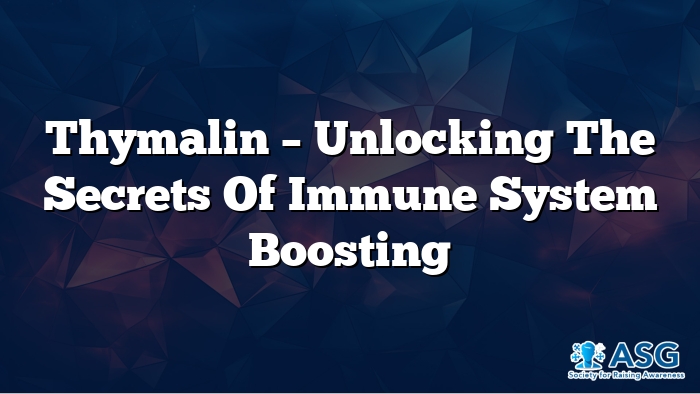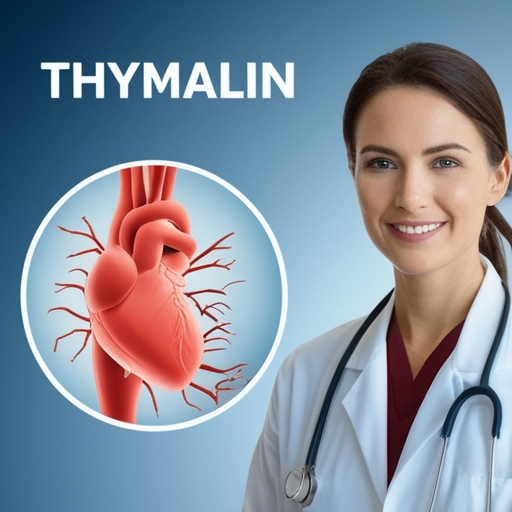Thymalin – Unlocking the Secrets of Immune System Boosting

Thymalin has emerged as a promising peptide in the realm of immunotherapy and longevity research. This powerful compound, derived from the thymus gland, has captured the attention of scientists and medical professionals alike for its potential to modulate the immune system and promote overall health.
As we explore the intricacies of Thymalin, we'll delve into its mechanisms, benefits, and potential applications in various fields of medicine. From its role in boosting immune function to its potential in treating age-related diseases, Thymalin offers a fascinating glimpse into the future of personalized medicine.
What is Thymalin?
Thymalin is a bioactive peptide extracted from the thymus gland, a crucial organ in the immune system. This peptide is composed of specific amino acid sequences that play a vital role in regulating immune responses. Peptide manufacturers produce Thymalin in various forms, including peptide powders and peptide vials, which are used in peptide reconstitution for administration.
The production of Thymalin involves rigorous peptide quality control measures, including peptide purity tests and peptide batch testing. These processes ensure the highest standards of quality and safety for users. Peptide certificates are often provided to verify the authenticity and purity of the product.
How Does Thymalin Work?
Thymalin's primary mechanism of action involves modulating the immune system. It achieves this by:
1. Stimulating the production and maturation of T-lymphocytes
2. Enhancing the activity of natural killer cells
3. Promoting the release of cytokines and other immune-regulating substances
This peptide interacts with specific receptors on immune cells, triggering a cascade of events that ultimately leads to improved immune function. By enhancing the body's natural defense mechanisms, Thymalin helps maintain a balanced and effective immune response.
Benefits of Thymalin for the Immune System
The immune-boosting properties of Thymalin offer several significant benefits:
• Enhanced resistance to infections
• Improved recovery from illnesses
• Reduced inflammation throughout the body
• Better overall immune function, especially in aging individuals
These benefits make Thymalin a valuable tool in maintaining optimal health and preventing various diseases. Its ability to modul

ate the immune system without overstimulating it sets it apart from many other immune-boosting compounds.
Thymalin vs. Other Immune Boosters
When compared to other immune-enhancing substances, Thymalin stands out for its specificity and effectiveness. Unlike general immune stimulants, Thymalin works by targeting specific components of the immune system, particularly T-cells and natural killer cells.
This targeted approach allows for a more balanced immune response, potentially reducing the risk of autoimmune reactions that can occur with non-specific immune stimulation. Furthermore, Thymalin's natural origin and low risk of side effects make it an attractive option for long-term immune support.
Potential Side Effects of Thymalin
While Thymalin is generally well-tolerated, it's essential to consider potential side effects. Some users may experience:
• Mild irritation at the injection site
• Temporary fatigue or flu-like symptoms
• Allergic reactions (rare)
Peptide safety is a top priority for reputable peptide suppliers. Users should always follow recommended dosages and consult with healthcare professionals before starting Thymalin therapy. Proper peptide storage and handling are crucial to maintain the compound's stability and effectiveness.
Thymalin Dosage and Administration
The appropriate dosage of Thymalin varies depending on individual factors such as age, health status, and treatment goals. Typically, it is administered via subcutaneous injection, with dosages ranging from 5-20 mg per day.
Peptide reconstitution is necessary before administration, which involves mixing the lyophilized peptide powder with sterile water or saline solution. Proper technique and sterile conditions are essential to ensure safety and efficacy.
Scientific Research on Thymalin
Extensive research has been conducted on Thymalin, exploring its mechanisms of action and potential therapeutic applications. Studies have demonstrated its effectiveness in:
• Enhancing immune function in immunocompromised individuals
• Reducing the incidence and severity of respiratory infections
• Improving outcomes in patients with autoimmune disorders
• Potentially slowing down age-related immune decline
These findings have paved the way for further investigations into Thymalin's role in various medical fields, including oncology, gerontology, and immunology.
Thymalin in Clinical Trials
Clinical trials involving Thymalin have yielded promising results. These studies have focused on various aspects of the peptide's therapeutic potential, including:
• Its role in enhancing vaccine efficacy in elderly populations
• Its potential as an adjunct therapy in cancer treatment
• Its effectiveness in managing autoimmune conditions
The outcomes of these trials have been largely positive, supporting the use of Thymalin in clinical practice. However, ongoing research continues to explore new applications and refine treatment protocols.
Thymalin for Aging and Longevity
One of the most exciting areas of Thymalin research is its potential role in promoting longevity and combating age-related decline. As we age, our immune function naturally diminishes, leaving us more susceptible to diseases and infections.
Thymalin has shown promise in:
• Rejuvenating aging immune systems
• Reducing inflammation associated with aging
• Potentially extending lifespan by improving overall health
These anti-aging properties make Thymalin a subject of great interest in the field of gerontology and regenerative medicine.
Thymalin and Autoimmune Diseases
The immune-modulating effects of Thymalin have shown potential in managing autoimmune diseases. By helping to balance the immune response, Thymalin may help reduce the severity of conditions such as:
• Rheumatoid arthritis
• Lupus
• Multiple sclerosis
While more research is needed, early results suggest that Thymalin could be a valuable addition to current autoimmune disease treatments.
Thymalin in Veterinary Medicine
The benefits of Thymalin extend beyond human medicine into the realm of veterinary care. Veterinarians have begun exploring its use in:
• Enhancing immune function in aging pets
• Supporting recovery from infections and surgeries
• Managing autoimmune conditions in animals
This cross-species applicability underscores the versatility and potential of Thymalin as a therapeutic agent.
Natural Alternatives to Thymalin
While Thymalin offers unique benefits, some individuals may seek natural alternatives for immune support. Some options include:
• Herbs like echinacea and astragalus
• Nutritional supplements such as vitamin C and zinc
• Lifestyle practices like regular exercise and stress management
It's important to note that these alternatives may not offer the same targeted immune modulation as Thymalin. Consulting with a healthcare professional can help determine the best approach for individual needs.
Thymalin and Cancer Treatment
The potential role of Thymalin in cancer treatment has garnered significant attention. Research suggests that Thymalin may:
• Enhance the effectiveness of conventional cancer therapies
• Improve the body's ability to recognize and destroy cancer cells
• Reduce the side effects of chemotherapy and radiation
While more studies are needed, the integration of Thymalin into cancer treatment protocols shows promise for improving patient outcomes.
Thymalin for Stress and Anxiety
Emerging research indicates that Thymalin may have beneficial effects on stress and anxiety. The peptide's ability to modulate the immune system may indirectly influence mood and stress responses. Some potential benefits include:
• Reduced cortisol levels
• Improved sleep quality
• Enhanced resilience to stressors
These findings open up new avenues for exploring Thymalin's potential in mental health and stress management.
Where to Buy Thymalin
For those interested in exploring Thymalin therapy, it's crucial to source the peptide from reputable suppliers. Online peptide stores and specialized peptide clinics often offer Thymalin for sale. When purchasing, consider the following:
• Look for vendors that provide peptide certificates and conduct peptide purity tests
• Check for proper peptide storage and peptide shelf life information
• Ensure the supplier offers reliable peptide customer service and peptide shipping options
It's essential to verify the peptide legality in your area before making a purchase. Reputable peptide vendors should be able to provide information on the legal status of their products.
Conclusion
Thymalin represents a fascinating frontier in peptide therapy and immune modulation. Its potential to enhance immune function, promote longevity, and support overall health makes it a subject of ongoing research and clinical interest. As we continue to unravel the complexities of the immune system, Thymalin stands out as a promising tool in our quest for better health and longevity.
While the future of Thymalin in medicine looks bright, it's essential to approach its use with proper knowledge and medical guidance. As research progresses, we may see even more applications for this remarkable peptide in treating various health conditions and improving quality of life.
Frequently Asked Questions
Is Thymalin safe for long-term use?
Generally, yes. Studies have shown Thymalin to be well-tolerated, but long-term effects should be monitored by a healthcare professional.
Can Thymalin be used alongside other medications?
In most cases, yes, but it's crucial to consult with a doctor to avoid potential interactions.
How quickly can I expect to see results from Thymalin therapy?
Results vary, but many users report noticeable improvements in immune function within a few weeks of starting treatment.
| Feature | Benefit |
|---|---|
| Immune Modulation | Enhances T-cell production and natural killer cell activity |
| Anti-Aging Properties | Supports immune function in aging individuals |
| Autoimmune Disease Management | Helps balance immune responses in autoimmune conditions |
| Cancer Treatment Support | May enhance effectiveness of conventional therapies |
| Stress and Anxiety Relief | Potential to reduce cortisol levels and improve stress resilience |
